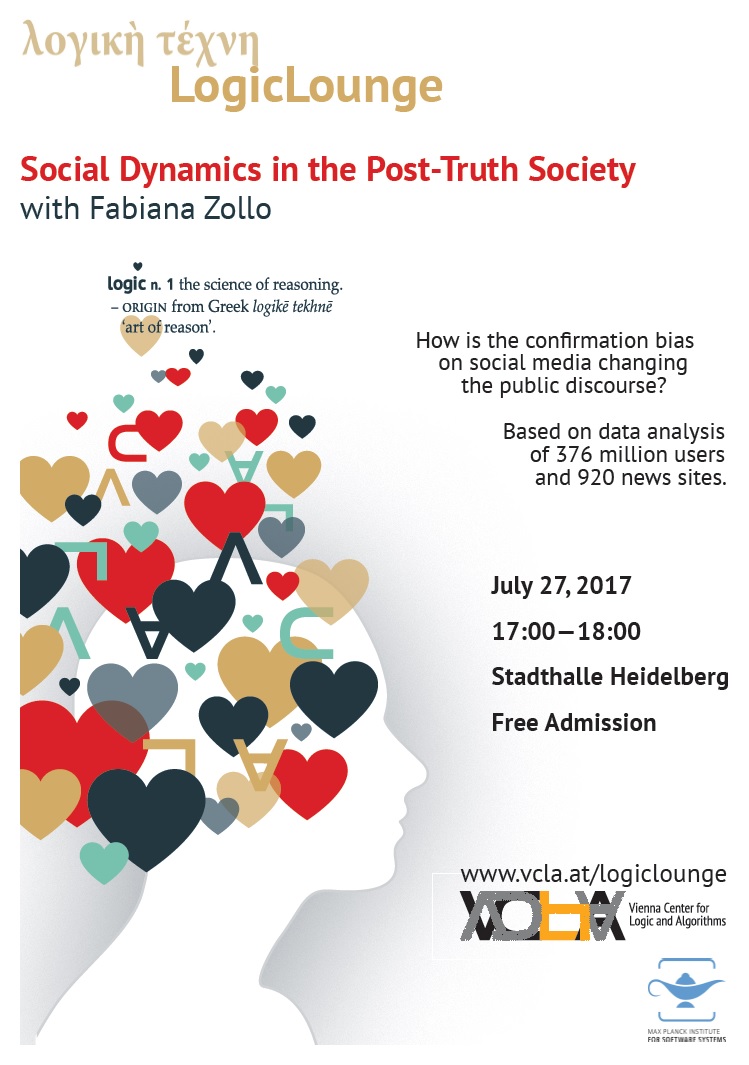LogicLounge with Fabiana Zollo: “Social Dynamics in the Post-Truth Society”
Social Dynamics in the Post-Truth Society: How the Confirmation Bias is Changing the Public Discourse
| DATE: | Thursday, July 27, 2017 – Thursday, July 27, 2017 |
| TIME: | 17:00 |
| VENUE: | Stadthalle Heidelberg (http://www.heidelberg-kongresshaus.de/) |

ABSTRACT
While many associate the use of social media with empowerment and access to information, there are those who warn about its power in construction of massive digital misinformation or so called fake news, which were labelled as the new geopolitical risks alongside terrorism and cyber attacks. The way in which individuals influence each other is one of the foundational challenges in several disciplines such as sociology, social psychology, and economics. Seize the opportunity to access the findings of research analysis on 376 millions users and 920 news outlets, and look under the hood of information diffusion in online social network platforms. Fabiana Zollo using Brexit and the Italian Referendum debate as an examples, she will talk about the existence of echo chambers, or so-called social media bubbles, and their immense impact on our analogous lives. She will present how the influence is built, what or who are the drivers of the content consumption, and what kind of digital behaviour can we expect in echo chambers which have effects on formation of public opinion.
Social Dynamics in the Post-Truth Society: How the Confirmation Bias is Changing the Public Discourse
Information, rumors, and debates may shape the perception of reality and heavily impact public opinion. The way in which individuals influence each other is one of the foundational challenges in several disciplines such as sociology, social psychology, and economics. In particular, on online social networks users tend to select information that is coherent to their system of beliefs and to form polarized groups of like-minded people – i.e, echo chambers – where they reinforce and polarize their pre-existing opinions. Such a context exacerbates misinformation, which has traditionally represented a political, social, and economic risk. Indeed, since 2013 the World Economic Forum has been listing massive digital misinformation at the core of other geopolitica risks, such as terrorism or cyber attacks.
In this talk we explore how we can understand social dynamics by analyzing massive data on online social media. We provide the empirical existence of echo chambers, showing that confirmation bias is the main driver behind content consumption. Moreover, we address the emotional dynamics inside and between different narratives, and investigate users’ response to both confirmatory and contrasting information. Moving beyond misinformation, we show that similar patterns may be observed around both the Brexit – the British referendum to leave the European Union – and the Italian Constitutional Referendum debates, where we observe the spontaneous emergence of well-segregated and polarized groups of users around news sources. Finally, we characterize the anatomy of news consumption on a global scale.
By means of a tight, quantitative analysis on 376 millions users and 920 news outlets, we show the natural tendency of users to focus on a limited set of pages (selective exposure) eliciting a sharp and polarized community structure. Our findings provide interesting insights about the determinants of polarization and the evolution of core narratives on online debating, and highlight the crucial role of data science techniques to understand and map the information space on online social media.
Biography
Fabiana Zollo is a Postdoctoral Researcher at Ca’ Foscari University of Venice and fellow member of the Laboratory of Computational Social Science (CSSLab) coordinated by Walter Quattrociocchi at IMT Lucca, Italy. With her cross-methodological approach, she focuses on information and misinformation spreading, social dynamics, and the evolution of collective narratives in online social media.
CSSLab (Laboratory of Computational Social Science) is home to research projects that develop innovative mathematical models and computational tools to better understand, anticipate, and control massive social phenomena with a complex systems approach – with the aim to develop data-driven computational models of complex socio-cognitive systems.
Video LogicLounge with Fabiana Zollo
Previous LogicLounges
LogicLounge was born out of the largest event in the history of logic research, Vienna Summer of Logic, attended by more than 2000 computer scientists from all over the world. LogicLounge is a place where the public and the scientists build bridges, recognizing the social embeddedness of information technology in post-modern societies. Between Toronto, and Vienna and Oxford, LogicLounge is coming to Stadthalle Heidelberg on July 27.
LogicLounge is open to the public as part of the 29th CAV 2017 – Computer Aided Verification Conference which is a prestigious gathering dedicated to the advancement of the theory and practice of computer-aided formal analysis methods for hardware and software, featuring distinguished keynote speakers on the forefront of scientific discoveries and their applications in industry. CAV 2017 in Heidelberg is organized by EPFL of Switzerland and Max Planck Institute for Software Systems of Germany.
Click here for the past LogicLounges

